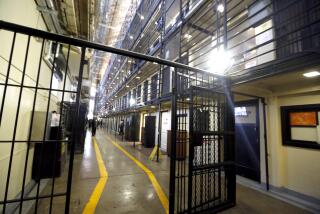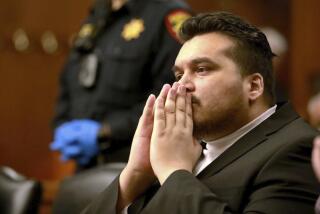Judge who halted California executions gets post in Washington
The federal judge who five years ago halted executions in California is leaving the San Jose bench, the state — and most likely a contentious death penalty case — for a new job in Washington.
U.S. District Judge Jeremy Fogel on Friday was named to direct the Federal Judicial Center and will be moving to the nation’s capital in October, long before any resolution in the protracted legal challenge to lethal injection can be expected.
Fogel said he has neither ruled out taking the case with him to the largely academic post as center director, nor determined whether that is an option under the judiciary’s rules. But Fogel noted that the court record in the lethal injection case brought by death row inmate Michael A. Morales is “voluminous” and would be a time-consuming task for another judge to take over.
Whether Fogel’s departure portends further delay in the case if it gets assigned elsewhere in the Northern District of California was unclear, legal experts said.
“Usually reassignments are made by the chief judge and the district clerk in consultation, but this is such a big case and Judge Fogel’s got so much invested in it in terms of expertise, I don’t know,” said Carl Tobias, a University of Richmond law professor who follows the federal judiciary.
Executions have been on hold in California since Fogel stepped in on the eve of Morales’ February 2006 lethal injection date to weigh whether the condemned man’s arguments that poor training and cramped conditions at the San Quentin death chamber had exposed previous condemned men to pain amounting to cruel and unusual punishment. After evidentiary hearings, including inspection of the death chamber, Fogel ruled 10 months later that the state procedures needed reform.
New procedures were drafted by the California Department of Corrections and Rehabilitation over the next three years, and the state adopted them nearly a year ago and presented them to Fogel for review. A month later, the state attempted to schedule the execution of convicted rapist and murderer Albert Greenwood Brown, which Fogel rejected as his judgment on the new protocols was still pending.
Efforts by the state to resume executions were further hampered in March when the corrections department and the attorney general requested a delay until next year to allow the new warden at San Quentin to put together another execution team. California has 714 death row prisoners, although only seven have exhausted their appeals.
With no activity in the Morales case expected until at least January, Fogel seemed to be weighing whether he could manage holding on to it while getting up to speed at the judicial center.
“It depends on what the rules are that govern this, whether there is an absolute requirement that judges give up their entire caseload or if there are exceptions,” said Fogel. “If there are exceptions, then it’s really up to me. But I’m just getting a handle on how much the demands of my new job are going to affect it.”
Fogel, 61, said he was inspired to leave the Bay Area, where he has lived and worked for 37 years, for “a big urban city and all that implies” to become the judicial center’s director for the next four to seven years.
“It’s a chance to synthesize what I’ve learned and a chance to do some big-picture thinking, to think about the judiciary as an institution and what it means,” said Fogel, who graduated from Stanford University before getting his law degree at Harvard Law School. “I’ve been a judge for 30 years, and this is an opportunity that rarely comes along.”
Appointed to the federal bench by President Clinton in 1998, Fogel would retain his status as a federal judge while heading the judicial center. He said he hoped to return to a federal courtroom after his Washington stint.
More to Read
Start your day right
Sign up for Essential California for news, features and recommendations from the L.A. Times and beyond in your inbox six days a week.
You may occasionally receive promotional content from the Los Angeles Times.







